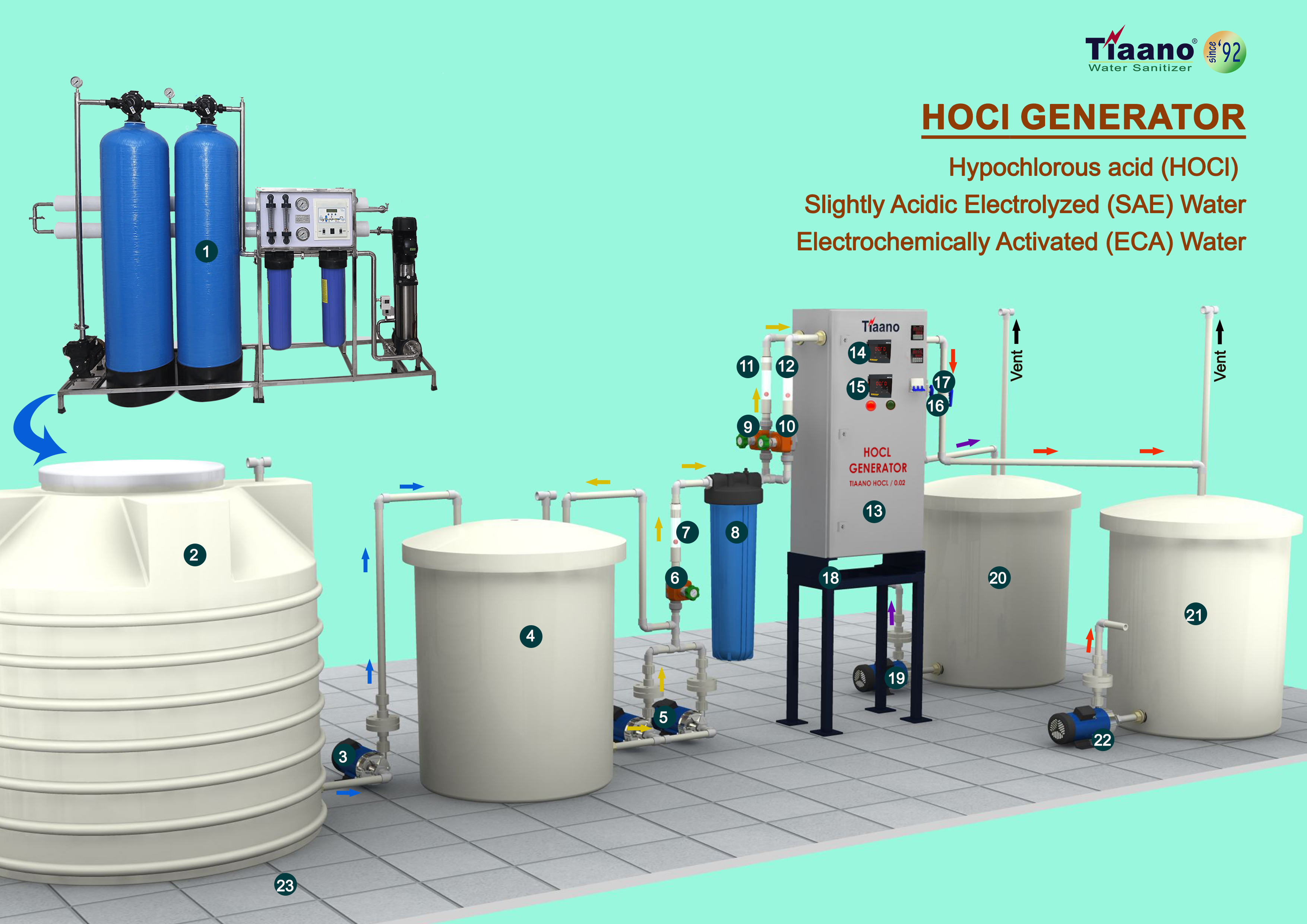Sodium hypochlorous plant generating (Slightly Acitic Electrolyzed Water)
We, Tiaano Design, manufacturing hypochlorous plant which is generating anolyte (HOCL) and Catholyte (NaOCL)using RO water and Pure industrial salt.
The ion exchange membrane which we used in the generator is made from a polymer which only allows positive ions to pass through from anolyte compartment and catholyte. That means that the only the sodium ions from the sodium chloride solution can pass through the membrane, and not the chloride ions. The advantage of this is that the sodium hydroxide solution being formed in the right-hand compartment never gets contaminated with any sodium chloride solution.
Sodium hydroxide (NaOH), also known as caustic soda or lye, is a highly versatile substance used in a variety of manufacturing processes. Sodium hydroxide is a co-product of chlorine production
The benefits of the HOCL (hypochlorous acid) is enormous:
Hypochlorous acid, unlike chlorine bleach, is 100% safe and non-irritant. If it gets on your skin or in your eyes, it will not burn. Even if it were accidentally ingested, it is completely harmless. Yet, it is 70-80 times more efficient at killing microbial pathogens than chlorine bleach.
Where can it be used?
In the home, hypochlorous acid is useful anywhere you need a sanitizer but don't feel comfortable using a toxic chemical. A perfect example is in the kitchen. Instead of rinsing leafy greens with water, use hypochlorous acid. Or for pesonal items such as toothbrushes or razors, hypochlorous acid is safe. Want to sanitize laundry without damaging or discoloring clothing, hypochlorous acid is the best solution and hypochlorous Acid as a Potential Wound Care Agent
1. HOCl is the scientific formula for hypochlorous acid, a weak acid similar to that of a mild citrus juice.
2. HOCl is made naturally by white blood cells in all mammals for healing and protection.
3. HOCl is a powerful oxidant that is effective against invading bacteria, fungi, and viruses.
4. Generating HOCl by running electricity through a solution of saltwater was discovered in 1970s.
5. HOCl is now used in healthcare, food safety, water treatment, and general sanitation.
6. Hypochlorous acid can be used at high concentrations (60 ppm) for food sanitation without requiring a post-rinse.
7. Sanitizers normally having 70% Alcohol which is harm for the lungs. Whereas HOCL is not harm.
Why is HOCl more efficient at killing pathogens than NaOCL
Hypochlorous Acid (HOCl) vs. Sodium Hypochlorite (Chlorine Bleach)
Hypochlorite ion carries a negative electrical charge, while hypochlorous acid carries no electrical charge. The hypochlorous acid moves quickly, able to oxidize the bacteria in a matter of seconds, while the hypochlorite ion might take up to a half hour to do the same. Germ surfaces carry a negative electrical charge which results in a repulsion of the negatively charged hypochlorite ion to the area of the germ surfaces, making hypochlorite ion less effective at killing germs. The ratio of the two compounds is determined by the relative acidity (pH) of the water. Water treatment specialists can adjust the pH level to make hypochlorous acid more dominate, as it is more efficient at killing bacteria. The hypochlorous acid's lack of electrical charge allows it to more efficiently penetrate the protective barriers surrounding germs.
Tiaano supplied Hypochlorous generator full skid with fully automated and manual operated systems as per the customer required capacities with RO and without RO , as well as HOCL solution ( Slightly Acitic Electrolyzed Water) in 5 liter cans.

FEEL FREE TO CALL US:
Ph: +91 9176883999 | +91 9444 56 9900
Web : www.tianode.com E-mail :dsa@tiaano.com
Profile: http://www.tianode.com/images/Profile-TiAnode.pdf
Ti Anode Fabricators Private Limited.
# - 48, Noothanchary, Madambakkam, Chennai - 126, INDIA.
GSTIN: 33AABCT9790N1ZN PAN: AABCT 9790N AADHAR: 7522 0783 3933
08b62d9f-b0da-4e13-9084-7944da3e6bd8|0|.0|27604f05-86ad-47ef-9e05-950bb762570c